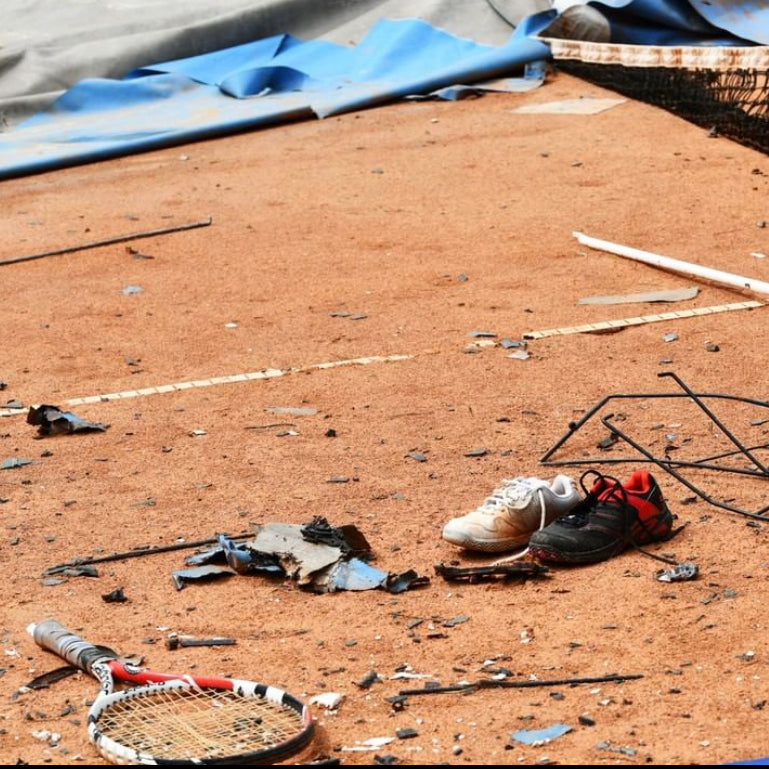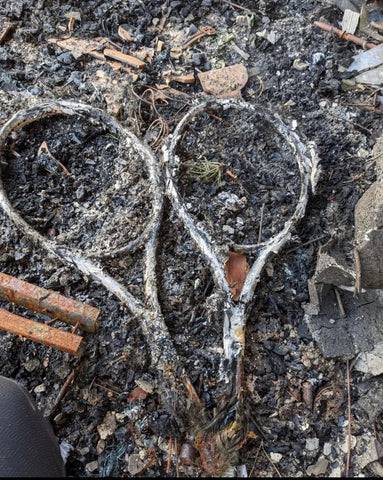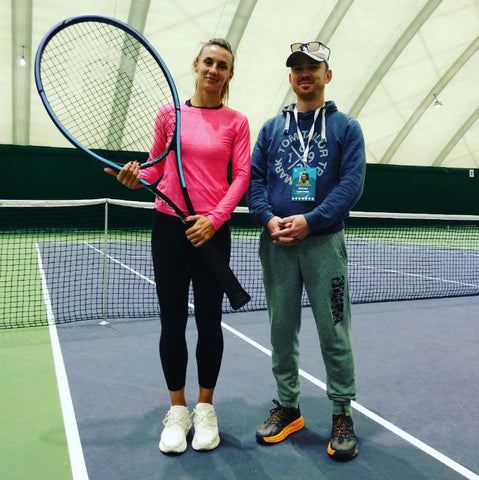
Tennis beyond conflict : an interview with Serhii Rudenko, racquet stringer in Ukraine
Share
It's been more than a year since the start of the Russian invasion of Ukraine, and with an end still far from being on the horizon, there's no question the scars being left will need a lot of healing and work to come back from. As with everything pertaining to the reality of war, the daily life of millions of Ukrainian citizens has been uprooted and shattered, disrupting the work and activities of normal people we take for granted. Of course, this includes sports, something that must now seems frivolous to most living on Ukrainian soil. Looking past the essentials needs of survival and defense, there is no denying that sports, including tennis, "offers a national identity, uniting countries nationally and internationally and can be used to shape values and morals within society"(WJEC, 2016), and we hope that sports can once again be a vehicle for solidarity and hope. Working in the racquet sports industry, we were intrigued to find out how tennis was (and is) surviving among the fallout of this devastating conflict.
A few month back. we started exchanging with a local counterpart, Serhii Rudenko, who works as a stringer and currently resides in Ukraine. Originally from the industrial city of Krivii Rih in the Dnepr region, Serhii has been working in the tennis industry as a salesman, stringer, and pro racket technician for the past 17 years and the only Pro Master stringer certified by ERSA and GRSA associations in Ukraine. Before the invasion, Mr. Rudenko was working with adult and junior pro players at a tennis academy, strung at Tennis Europe tournament as well as being the head stringer at the ATP Challenger Kyiv Open in 2021.

We were humbled by his generosity and story and wished to bring it forward with a few questions about what life as been like in Ukraine from the perspective of a tennis passionate and worker. Here they are :
How did your situation change at the start of the war?
SR: Since that day, everything has changed significantly. Fortunately, I survived. I still do remember that morning clearly, my mom called me, and she was so scared. At that moment, I was so close to the occupied territory Bucha and Irpin, about 10 km or even less. I saw and heard so many missile attacks, destroyed buildings, and other terrible things. I was shocked and just didn't believe what was going on. It was dangerous to stay alone at home, so I took my bicycle and grabbed some food, warm clothes, and went down to the nearest bomb shelter. There were a lot of elderly people, especially children. We did our best to help them. We organised a volunteer group to guard and patrol the neighbourhood. The first weeks were the most difficult period, but our brave army defended Kyiv. Finally, I had the opportunity to go to my family, to see my mother, grandma, and my beautiful yellow labrador who were still in Krivii Rih. It was the most memorable day of my life. We volunteered together and supported the armed force, and I also donated my tennis supplies like bags strings rackets, etc. to junior players who moved abroad with nothing.

The aftermath of bombings
What was the state of tennis in Ukraine before the war?
SR : Tennis in Ukraine, especially in Kyiv, was very popular, I would say club-level tennis was growing up but unfortunately it's not affordable for most people who want to play regularly and professionally all year long. In Ukraine, there are almost no public courts at all. The dry and clay outdoor season is the best time for players. Rental prices for indoor tennis courts are so high they could be between 27-37 CAD per hour. We had a few ITF and Tennis Europe tournaments. In 2021 there was the ATP Challenger event, which of course I couldn't miss it and went to work at. I strung for Sebastian Baez, Nuno Borges, Quentin Halys, and many more guys from the top 150. I suppose tennis in Ukraine had a bright future, but not now, and maybe the situation will change somehow.
What is your current occupation or volunteer post?
SR: Last summer I was invited to work at the Wilson store (nb: in Kyiv) as a stringer and salesperson, at least now I have an opportunity to string for club players and sell equipment and make some money for a living. I cannot complain, I could be in a much worse situation, I know it's temporary and everything is going to be all right soon. Also, I do not forget about self-study, it helps a lot with stress. Learning French is my new passion, I have always admired this beautiful language. J'adore le français. Also exploring new information about tennis products and new technologies. Communicating with pro stringers around the world is necessary and useful for me too.
What were your favorite experiences as a tennis stringer?
SR: During my stringing career, I've always wanted to reach the level of qualification that allows me to work with pro players. When I moved to Kyiv and started stringing and customizing for pros with ATP and WTA rankings at a popular tennis club, it was an actually unbelievable feeling for me finally put into practice all my skills and knowledge. I did so many rackets for an incredibly friendly and famous Ukrainian player, Lesia Tsurenko, we was testing new strings and new set-ups. She was trying to find the most adequate solution for her elbow using natural and monofilaments and we did it. This experience I will never forget.
The next milestone in my life was the ATP Challenger Kyiv Open 2021.

Lesia Tsurenko and Serhii
What are your favorite strings and rackets to string and why?
SR: It's a tough question I have to say. Luckily, today we have an enormous amount of tennis brands and lots of them produces different types of strings and "easy to string" rackets. For instance, marking knots spots, big holes for thick gauge hybrids, more standard and understandable string patterns, etc. and it definitely makes our stringing lives much more comfortable. However, as a pro stringer, I do have my favorite string to work with. Undoubtedly, it is natural gut and there are many reasons why. During the stringing, it requires you to focus on all small details, not rush, be gentle, and at the same time I always enjoy this process. The gut is super soft, usually takes less time than hard monofilaments, and fingertips are happy. It's like real therapy for me. Honestly, of course, working with open string patterns 18/16 or 16/18 especially when you do 15-25 frames per day is fantastic but I would say that every frame I string is my favorite one. In most cases, we cannot choose, so having only 18/20 with 1.30 stiff monofilaments all day long it's absolutely fine, it's my responsibility, my duty.
What is your favorite thing about stringing?
SR : Generally, I am crazy about tennis, I adore playing, watching, and selling tennis equipment. Literally, I'm able to talk about tennis strings for hours there's so much to discuss. Taking care of tennis rackets is not only my huge passion and lifestyle, it's my calling and mission. I did maybe 10.000 + frames and never got bored or mentally tired. It's not easy to find words and describe this feeling, it's always fun, and it brings me lots of joy and happiness. Meditation is probably an appropriate word I can use. Another significant part of my job is communicating with players and customers. Giving advice on new products, promoting hybrids setups, customizing and matching, and many many more. As a professional stringer for many years, I learned a lot, for example, always to do my job perfectly and on time no matter what. I just cannot let players down, they count on you and trust you and that's why they come back again and again. Having a reliable stringer nearby is essential, it might sound ridiculous, but I believe that it is similar to having for instance a dentist or a lawyer who knows what to do best when you need attention.
How do the Ukrainians perceive the sanctions put up against Russian & Belarussian players on tour so far?
SR : It's a controversial topic for discussion. In my opinion, sports and politics are connected, players represent their countries. At the very least, they should definitely tell the truth, will that be enough to make a difference? I don't know. Only Wimbledon made restrictions last year. However, we can see that many players around the world support Ukraine, do charity exhibition matches, and donate to foundations.
Is there a message you'd like our readers to remember?
SR : First of all, I want to say a huge thank you to Canada and all your kind people for helping and supporting the Ukrainians. We do appreciate it a lot. Personally, talking about the war, I still cannot understand, and probably never will why people can be so cruel to each other, this is absolute madness. During this invasion, I have reconsidered lots of fundamental things. Of course, there is nothing more important than people's lives and our families. No matter what we must always protect our homes and support relatives, and everyone who needs help. Tough times make us stronger and more efficient, and now I feel that I've become more "durable" than I used to be. We always need to believe in ourselves and our goals and never give up. Never! In my situation, I am absolutely convinced that my successful stringing career is not over, and now nothing can stop me and destroy my dreams. When you do what you love the most and you are obsessed with it everything is possible. Just don't stop fighting! Please feel free to contact me if you have any questions.
Follow Serhii on Instagram @tennis_iris